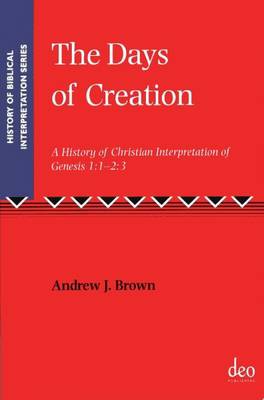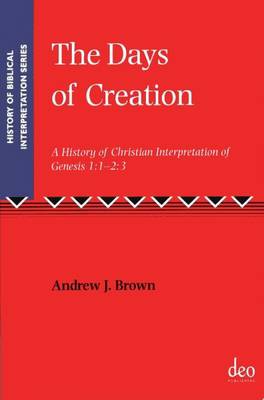
Je cadeautjes zeker op tijd in huis hebben voor de feestdagen? Kom langs in onze winkels en vind het perfecte geschenk!
- Afhalen na 1 uur in een winkel met voorraad
- Gratis thuislevering in België vanaf € 30
- Ruim aanbod met 7 miljoen producten
Je cadeautjes zeker op tijd in huis hebben voor de feestdagen? Kom langs in onze winkels en vind het perfecte geschenk!
- Afhalen na 1 uur in een winkel met voorraad
- Gratis thuislevering in België vanaf € 30
- Ruim aanbod met 7 miljoen producten
Zoeken
€ 37,95
+ 75 punten
Omschrijving
The Days of Creation examines the history of Christian interpretation of the seven-day framework of Genesis 1:1-2:3 in the Hebrew Bible/Old Testament from the post-apostolic era to the debates surrounding Essays and Reviews (1860). Included in the survey are patristic, medieval, Renaissance/Reformation, eighteenth-century Enlightenment and finally early to mid-nineteenth-century interpretations of the days of creation. The author shows that readings of Genesis 1:1-2:3 in the modern era have much deeper roots than is sometimes realized. The "day-age' scheme has roots in Augustine's figurative creation days, the world-week historical scheme, Renaissance Platonism and Newtonian science, while the "literal' alternative of the gap theory combines ancient literal interpretation with chaos concepts derived from Greco-Roman myths and interpreted through a geological lens. Early treatments of this text are poorly understood because of their very different philosophical and theological contexts. Hasty appropriation of ancient precedents as support for modern interpretations often overlooks or oversimplifies this difference. Changing ideas and exploration in the early Modern era undermined the dominance of this text, so that by the time of Goodwin's essay in Essays and Reviews, Genesis 1:1-2:3 was already well on the way to its present intellectual marginalization. This study enables an insight into the mighty career of a biblical text of seminal importance, and fills a significant niche in reception-historical research.
Specificaties
Betrokkenen
- Auteur(s):
- Uitgeverij:
Inhoud
- Aantal bladzijden:
- 376
- Taal:
- Engels
- Reeks:
- Reeksnummer:
- nr. 4
Eigenschappen
- Productcode (EAN):
- 9781905679270
- Verschijningsdatum:
- 1/01/2012
- Uitvoering:
- Paperback
- Formaat:
- Trade paperback (VS)
- Afmetingen:
- 152 mm x 232 mm
- Gewicht:
- 521 g

Alleen bij Standaard Boekhandel
+ 75 punten op je klantenkaart van Standaard Boekhandel
Beoordelingen
We publiceren alleen reviews die voldoen aan de voorwaarden voor reviews. Bekijk onze voorwaarden voor reviews.









